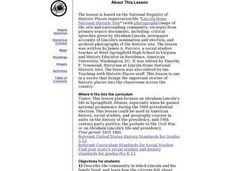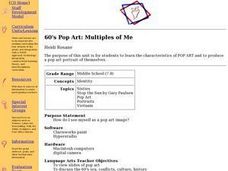Curated OER
Progress Amidst Prejudice: Portraits of African Americans in Missouri, 1880-1920
Students explore and analyze a database of historical portraits of an African American family of the late 1800's. They trace the migration of one of the African Americans as he/she migrates toward urban areas.
Curated OER
Learning From Document - Public Laws
Students research primary sources about the Bracero worker program. In this primary source lesson, students investigate two public laws along with other documents to determine if the Bracero worker program was implemented properly. They...
Curated OER
Spy on a Spider
Students view slides or live specimens to name and describe the distinguishing features of groups of arthropods, especially spiders and insects. They complete worksheets, observe webs and then search for and record where spiders can be...
Curated OER
The Many Faces of Chimney Rock
Students will compare and contrast images of Chimney Rock that are part of the Nebraska Western Trails project. They view postcards, pictures, photos and paintings of Chimney Rock and then observe and chart the differences and similarities.
Curated OER
Lincoln Home National Historic Site
Students investigate the community in which Lincoln and his family lived and explore how the citizens felt about him. The national issues that inspired Lincoln to act decisively in politics and that propelled him to the White House are...
Curated OER
Folklore in Zora Neale Hurston's Their Eyes Were Watching God
Learners read Zora Hurston's Their Eyes Were Watching God and explore her life history as well as novel analysis activities. In this novel analysis lesson, students identify elements in the novel and its overall literary impact. Learners...
Curated OER
What Personal Journals Tell Us
Pupils read primary source journals from the Nebraska Western Trails Project. They work in groups to analyze the journal entries and complete a worksheet. Students then write an individual essay on the experience and consider what kind...
Curated OER
60's Pop Art: Multiples of Me
Students discover characteristics of Pop Art through slides and discussion of the 60's era and produce a pop art portrait of themselves using Clarisworks paint program and Hyperstudio.
Curated OER
Pop Art: Multiples of Me!
Students discuss major events in the 60's era including conflicts, culture, and history. Students also take a look at artists from this time and discover Pop Art. They then create their own portrait in the Pop Art style using Clarisworks...
Curated OER
History of Miss America
Students make a time-lines of of decades using images from Miss America. For this history lesson, students looks at the country's beauty pageant and how it changes the lives of women in America. Students debate issues such as size...
Curated OER
An Investigation of Primary and Secondary Sources Using The Records on Mary McLeod Bethune
Students listen to a summary of the life of Mary Bethune. They read or listen to an excerpt from an interview with Mary Bethune. They discuss the differences between the transcript and the draft of the biography.
Curated OER
Eleanor Roosevelt National Historic Site
Students study Eleanor Roosevelt's spirit, personal style, and humanitarian efforts. They investigate their own community for volunteer organizations dedicated to helping others.
Curated OER
Selavi
Students read the novel "Selavi". They relate the story to their own experiences. They also make predictions as they read the story. They research a specific aspect of Haiti once they have finished reading.














